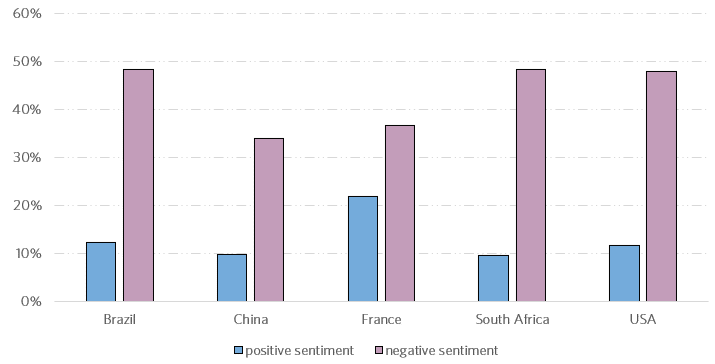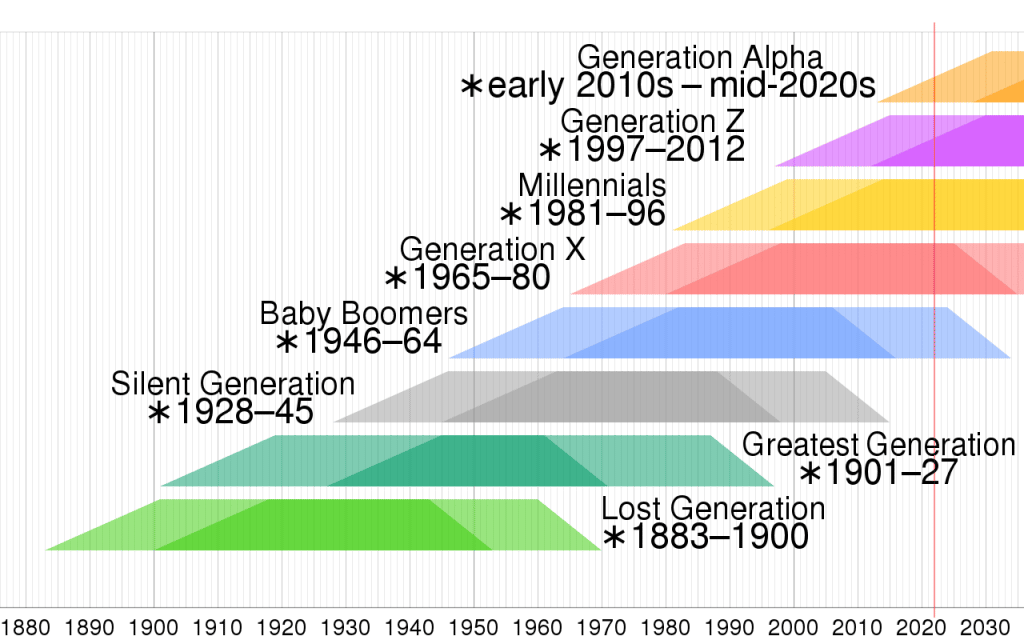The young generations have a negative view of the corporate world. This is one of the conclusions of our study entitled EYES 2021 (Emergy Youth Early Signs), which analysed the tweets posted between July 2020 and June 2021 by 18- to 24-year-olds from five countries: Brazil, China, France, South Africa, and the United States. We analysed 53,200 tweets containing the words “world of work” or “professional world” or “working world”, published by 4,900 young people.
Nearly half (48%) of the tweets by young Brazilians, Americans and South Africans mentioning the word “companies” were negative. The numbers drop to 37% and 34% respectively for French and Chinese youths. This opinion, shared beyond borders, challenges the paradigms that currently govern paid employment. The negative view of the corporate world extends to a lesser degree to the world of work, which generates apprehension and criticism.
What is behind this general and international rejection of the corporate world?

Companies are expected to take a political stance.
The youngest/future wage earners expect their company to play an active political, societal and environmental role. A company’s prestige alone is no longer enough to attract young talents. According to a survey by Yougov institute for L’ADN, just 9% of French 18- to 24-year-olds consider it a factor in choosing their future employer. Conversely, 89% consider that the image their company conveys online and on social media is important1. Companies are embracing this call for a political stance. On social media, the major American corporations publicly showed their support for the Black Lives Matter movement in May 2020, accounts and logos are donning the colours of the LGBTQ+ rainbow flag during Pride Month, etc.
However, between communication and action there is still significant room for improvement. According to a survey of French youths conducted in late 20212, only 6% of them consider positions taken in the media to be sufficient proof of commitment to a cause. In fact, our EYES 2021 study reveals that 18- to 24-year-olds are not taken in by clever marketing. Our report highlights a desire for greater inclusivity and equity in the professional world. For example, many tweets by young Americans denounce the discrimination minorities experience at work. Young people are also interested in sustainable development, and environmental and social responsibility. #BigPharma, #BigTabacco, #BigTech are frequently used to condemn companies blinded by the pursuit of profit while appearing to have little concern for the common good. There again, lip service does not go over well: #GreenWashing is a hashtag frequently used by French and American youths. Besides criticism of misinformation regarding environmental impact, the recurrence of the word “hypocrisy” in the most engaging French tweets about the world of work is striking; it can be found in nearly 10% of tweets posted between May 2020 and April 2021. This shows that young people have a very moralistic attitude toward companies.
According to a worldwide survey conducted by Deloitte in 20213, 44% of Millennials (or Gen Yers, 27 to 38 age group) and 49% of Gen Zers (18 to 26 age group) report having aligned their career choices with their personal ethics. In France, several initiatives are mushrooming online to help wage earners, and young people in particular, find a company that is the right fit for them: Shift Your Job provides a list of companies “identified as contributing to the carbon transition”; Jobs_that_Make Sense lists vacancies for jobs with a positive impact, for those “wanting a meaningful career with purpose”; Equally Work is a participatory platform for evaluating companies based on their internal practices (discrimination, inclusivity, environmental impact).
Young people expect companies to have a positive impact on the environment and on society. This transformation, already underway, will require changes to the policies and practices within the company, the only true indicators of a genuine political stance.
Young people want flexibility in working hours.
The COVID-19 crisis seems to have reinforced the frustrations of employees, notably in the United States, which saw record numbers of people quit their jobs as part of a phenomenon being called the Great Resignation or Great Reshuffle. According to a survey conducted by Adobe in May 2021 in five countries4, more than a third of wage earners are considering changing jobs in the coming year. The trend is especially pronounced in the 18 to 24 age group, where more than half plan to quit their job in the next twelve months. Driven by higher expectations, they seek out better working conditions: 74% report being willing to change jobs for a better work-life balance, 66% to have more control over their working hours, and 63% to be able to work remotely.
When asked about the practices companies could implement to improve work-life balance, 37% of young people answered flexible working hours, ahead of annual leave (34%), sick leave (34%), and mental health leave (31%)5. Offering greater flexibility with organization would attract young talents, who are uncompromising on their need for rest and their autonomy at work. Indeed, one third of Gen Zers state that they would not tolerate being obligated to work when they do not want to, not being able to take leave when they want to, or not having any decision-making power over their working hours. Just 62% state that they are more productive during standard office hours (9 a.m. to 6 p.m.), the lowest percentage across all generations5.
Work is a means to an end.
In Europe, 56% of youths aged 18 to 25 would give up part of their salary to have more free time1. In China, this need is reflected in “Tang ping” (“lying flat”), a social protest movement which spread on social media last spring and denounces the culture of overwork. Rather popular among youths, Tang ping advocates inaction by refusing to work, exert effort, consume or marry. It is about doing the bare minimum necessary to meet one’s basic needs, while enjoying one’s free time. Its subscribers de-correlate work and happiness, making their private life the priority. Chinese youths are not alone in challenging fulfilment through work. Overall, young people are more inclined to see their job as a means to provide for their needs rather than a way to self-actualize. Many of them see their job primarily as a means of earning money (44%) rather than as a career (33%)5. They find fulfilment outside of work.
For young people, work is all about the salary.
Gen Zers have high salary expectations. Their time is precious, so it should be remunerated accordingly. Our EYES 2021 study showed that, among French youths, “salary” is the second most frequently mentioned word on the topic of work. Several surveys corroborate our results. The Workforce Institute study found that more than 50% of young people consider salary to be the most important factor when they are choosing their first job (54%) and hope to be promoted at least once per year (57%). In addition, 44% of Gen Zers evaluate their success at work based on their level of remuneration. This is less true in China, where half of young people say the respect of their colleagues is the top evaluation criterion5.
Digitalization for greater productivity. But that is all.
Bent on productivity, 70% of Gen Zers state that, all things equal (pay and duties), they would change jobs to obtain better tools enabling them to be more efficient. This is the generation that most wants this digitalization4. However, this should not be interpreted as them wanting “all digital at any cost”. Young people want a work setting where in-person interactions with their colleagues and managers are possible. While 35% of 18- to 25-year-olds praise full-time teleworking, 65% of them prefer some degree of physical workplace attendance: some of the time (41%) or all of the time (24%)1. In France, 4 out of 10 young people prefer this hybrid way of working. On the other hand, working from home full-time, hot desking, or co-working generate little enthusiasm2. We can only encourage companies to embrace digitalization but maintain essential in-person interactions.
Young people feel underprepared when arriving on the job market.
Newly graduated or on the verge of beginning their working life, many 18- to 24-year-olds feel that school does not give them the tools necessary for a smooth transition to the professional world. Our EYES study shows that young people, particularly in France and the United States, are disappointed in their country’s education system. They sometimes feel that there is too much emphasis on theory and the knowledge they are taught is far removed from the practical realities of the workplace. Their experience of the transition from student to employee is a letdown; they feel that they do not know the codes of the workplace and they lack skills that are essential to career satisfaction. More than a quarter of Gen Zers feel that school did not prepare them for negotiation, networking, public speaking, working long hours, or resolving conflicts5. For example, 53% of French youths cite lack of professional experience as an obstacle to getting their first job, and for 23% the issue is a lack of training or skills2. They want a more effective education system. Secondary and higher education should promote an education that meets the needs of the labour market. Multiplying interactions with professionals, offering internships, integrating work experience placements into the curriculum, and promoting work-based training are some avenues to explore. The difficulties in accessing employment cannot be attributed solely to a lack of preparation; the cultural factor seems to play a substantial role. 35% of French youths cite society’s lack of confidence in young people as a barrier to obtaining a first job2.

Is Gen Z unique or are these aspirations timeless?
Is the attitude of young people toward the corporate world today different to that of youths in the past? An international survey of 16- to 29-year-olds6 (the Millennials generation) conducted by Fondapol and Kairos Future in 2008 shows that, where working hours are concerned, young people 15 years ago had very similar desires to young people today. Flexibility of working hours, for example, obtained majority agreement from the young respondents. A survey conducted by PwC in 2013 arrived at the same conclusion7. It is interesting to note that an article from 1999 already mentioned this trend among Gen Xers, who were aged 19 to 34 at the time8.
In 1997, an American daily newspaper interviewed an expert in human resources, who stated that members of Generation X “[did] not want to be ruled by the company” and they wanted to “have a life” outside of work. The expert also pointed out that: “On the other hand, they’re impatient waiting for job promotions and want all the perks associated with ‘paying one’s dues’”9. The authors of the Fondapol and Kairos Future study (2008) drew the same conclusion about Gen Yers at the same age: “[They] are assigning more importance to their free time.” We find these characteristic traits in today’s Generation Z.
Similarly, another Fondapol survey, from 201110, highlighted the importance Millennials attached to earning a good salary. For them too it was the factor most often cited as the mark of a good job (with the exception of young people from Morocco, Scandinavia, China and Japan). This criterion ranked higher than workplace atmosphere and interest in the area of work. There again, work seemed to be a means of earning a living before being a way to self-actualize.
What about the feeling of distrust that characterizes young people’s attitude toward the corporate world? Has it always existed? We found mention of it in France, in the 2008 research of the Centre d’études de l’emploi11 (Centre for Employment Studies), which established that French people under the age of 30 were already adopting “an attitude of distrust and scepticism toward the corporate world”. According to the author of the report, career instability and interruptions, along with disloyal behaviour on the part of companies (broken promises to hire or promote, termination of long-serving employees) are factors that were leading young people at that time “to evaluate, with a more short-term vision than their elders, the quality of the wage-work bargain in place between themselves and the company, and the respect for the balance between their contribution and the wage they received in return”. Work yes, always, but never at any cost.
In conclusion, it would seem that the opinions expressed by young people today are simply an exacerbation of aspirations that already existed in previous generations and were not addressed. The issue now appears critical and deserves the full attention of decision makers.


